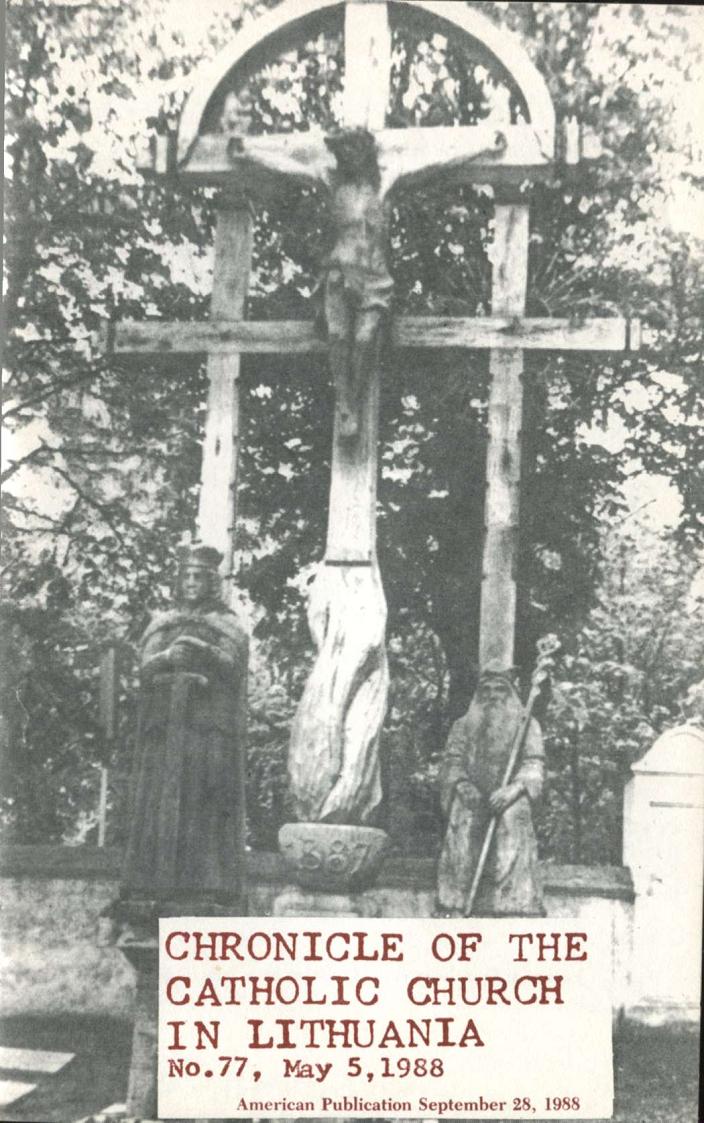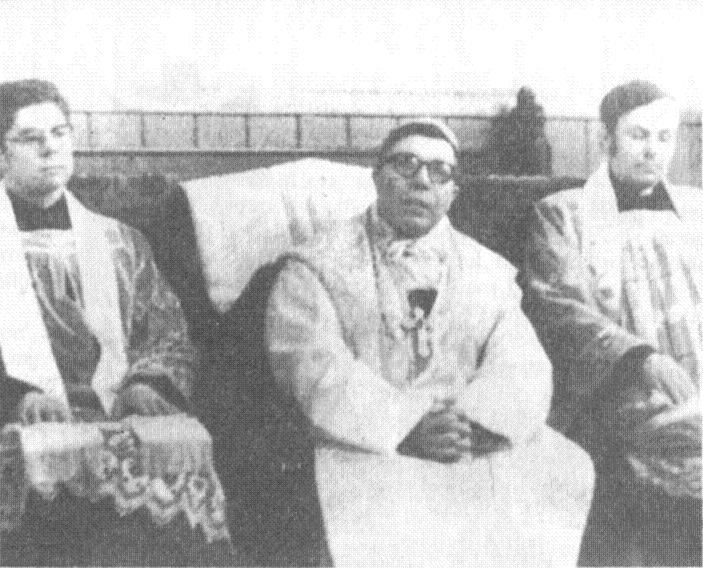
Appearing since 1972
Read this and pass it on!
THE CHRONICLE OF THE CATHOLIC CHURCH IN LITHUANIA, NO. 77 
In this issue:
1. Hail the Heroes of Church and Nation!
4. Searches and Interrogations
Lithuania May 7,1988
On December 2, last year, we commemorated the 101st birthday of one of the most outstanding members of the Catholic Church in Lithuania, one of our foremost men of science, and citizens, Pranas Dovydaitis. The commemoration was held at the Carmelite Church in Kaunas. The preacher described in depth the multi-faceted activities of Pranas Dovydaitis, his service to the Catholic Church and to Lithuanian science.
Dovydaitis, by harmonizing his public and scientific endeavors with the truths of Christ's Gospel, became an example to us Lithuanians, a guiding star for all walks of life. His directives and advice to the teachers of Lithuania and the shapers of her culture have not lost their relevance to this day.
On January 27,1988, during evening services in the church of Prienai, Professor Antanas Maceina was memorialized. Such commemorations are gradually becoming traditional. It is most regrettable that the average listener or reader in Lithuania does not have the opportunity to investigate the literary and philosophical legacy of Antanas Maceina. This is a great loss for everyone, but especially for the younger generation. Such commemorations make it possible to become more familiar with one of the most significant and creative minds in Christian philosophy, not only in Lithuania, but in all of Western Europe.
Kapsukas
On January 14,1988, in the Kapsukas City Internal Affairs Division, a criminal case was brought against Petras Gražulis, an employee at the church in Sasnava. He was accused of deliberately avoiding military training in the Soviet Army.
A session of the court scheduled for January 26 did not take place, because of three witnesses scheduled to testify against Gražulis, two did not show up. The session was postponed to February 2.
On February 2, relatives and several score friends of Petras Gražulis were admitted into the courtroom. The rest of his friends were forced to freeze outside. They were closely watched by militia and KGB agents, who urged them from time to time to disperse. The crowd was constantly videotaped by television technicians especially summoned from Lithuanian television for the occasion.
The Catholics of Lithuania presented to the Delegation of the Intcrnational Helsinki Federation, visiting Moscow at the invitation of the government of the U.S.S.R. at the end of January 1988, this document:
Concerning the Plight of Believers in Lithuania
The plight of believers in the U.S.S.R., and by the same token, in Lithuania which has been annexed to the U.S.S.R., is determined by Soviet law in which, albeit frequently in disguised fashion, it is stated that in the U.S.S.R., religion must be rendered irrelevant. And only because the law is often executed in slip-shod fashion, have believers in the Soviet Union so far succeeded in retaining some of their positions.
In the Preamble to the Constitution of the U.S.S.R., it states: "The highest purpose of the Soviet state is to a classless, Communist society... to develop the man of the Communist society..."
At the beginning of February 1988, at the direction of the Republic Procurator, the following persons were warned at local procurators' offices: Father Antanas Šeškevičius (Associate Pastor of Gargždai parish) Father Vincas Vėlavičius (Telšiai Cathedral Mass-priest) Genovaitė Krisiūnaitė (Alytus II parish organist) Veronika Beišytė (Kapsukas) Kryževičius Family (Kaunas) Monika Gavėnaitė (Šiluva) Sigitas Gudaitis (Prienai)
It was emphasized to them that if they signed petitions similar to those addressed to people of good-will world-wide, they would be penalized in accord with Criminal Code, Par. 68.
Kapsukas
On February 2,1988, at the end of Petras Gražulis' trial, the following were crudely and unjustly detained by the KGB: Vincas Danielius (Šiauliai) Gintas Sakavičius (Kapčiamiestis) Rimantas Matulaitis (Kapsukas) Bronė Valaitytė (Sasnava).
Father Sigitas Tamkevičius writes:
"... Working at the loom, all day long I can meditate, pray, and make the Way of the Cross. Such has been my Lent, and my retreat. After work, I don't feel like doing anything, or reading. And so it goes, day after day. Meditating on Christ's Way of the Cross, in prayer I remember all the Veronicas and Simons of Cyrene who, one way or another, have been with me in prayer or by letter. By their idealism and solidarity, many have wiped away the sweat of my brow and many have lightened my burden. The assistance of some, I saw with my own eyes. About others, I knew. And still others, I unerringly felt next to me. God, how good it is to be alive when one sees alongside oneself, or at least senses, so many good people and loving hearts. These people are the targets of the world's hatred, enmity, and suspicion. So to all the Veronicas and all the Simons of Cyrene, a thousand thanks!
"Not long ago, we all saw over Central Television, the film about Father Alfonsas Svarinskas. Looking on was the film's principle hero. Afterwards, our commentaries and congratulations followed. It appears that in any mirror, it is possible to recognize a good priest's face — of course, if only one's vision has not weakened too much.
Kaišiadorys
On January 17, 1988, in the Cathedral of Telšiai, His Excellency, Bishop Vincentas Sladkevičius, having read the lesson and Gospel designated for the Sunday, addressed the faithful, saying that it is necessary to love truth and if need be, to defend it from lies and calumny. The bishop said that he felt an obligation to respond to an article concerning him by correspondent A. Chaikovsky, published January 12, 1988, in Tiesa. The article is called, "The Chronicle is Based on Calumnies".
"What is written in this article concerning me," the bishop said, "is a pure lie. The only truth is that I was prepared that day to go out when two strangers called on me and introduced themselves as correspondents of Tiesa."
The bishop received them as he does all callers on business. The strangers were officious and aloof, the tone of their questions, almost aggressive. The first question: "Why do you refuse to pubish a Catholic newspaper?"
The bishop replied breifly, "We refuse because it is obvious to everyone that the newspaper will not be the kind Catholics need. We need a newspaper similar in content to the kind which Catholic dioceses publish, for example, in the German Democratic Republic."
The second question: "Do you read the Chronicle?"
The bishop responded, "Not now."
To the question, "Did you read it earlier? What do you think of it?", the bishop explained that the Chronicle is a necessary publication since it raises difficulties which the Church in Lithuania and the faithful, victims of discrimination and of attacks by the atheists and officials, encounter.
Here the bishop gave the reporters an example, in connection with his mother's funeral. While the bishop was in internal exile, his mother died. The mother wished to be interred in her native parish of Žasliai. When application was made to the local government asking for a truck to take the casket with the mother's remains to Žasliai, government officials sarcastically retorted, "Let his mother rot here..."
Having listened to the bishop's account with frowns on their faces, the

Bishop Vincentas Sladkevičius, created Cardinal in May 1988.
reporters put a third question: "What do you think of Father Rokas Puzonas?"
The bishop replied that Father Rokas Puzonas is a good, exemplary priest. Such is the opinion of all the priests.
Žarėnai-Latveliai (Šiauliai Rayon)
On January 9, 1988, Šakynai Chairman Valdemaras Meiliulis and a KGB agent called on Mrs. Barystienė, a resident of Žarėnai-Latveliai. The KGB agent would not give his name. Mrs. Barystienė was warned that her daughter, Rasa Barystaitė, was associating with church washerwoman Regina Teresiūtė, and the latter, in the words of the officials, is a "foreign spy". They tried to frighten the woman, accusing the pastor of the parish, A. Pakamanis, of distributing poisoned candy to children coming to church.
After a brief questioning, Mrs. Barystienė was told to sign a vague official report. On January 13, a similar government delegation again showed up at the Barystis home. Explaining that they were from the newspaper and had come to gather material concerning Father Pakamanis and Miss Teresiūtė, they repeatedly ordered the parents not to allow the children to associate with them. They kept calling Miss Teresiūtė "a spy".





